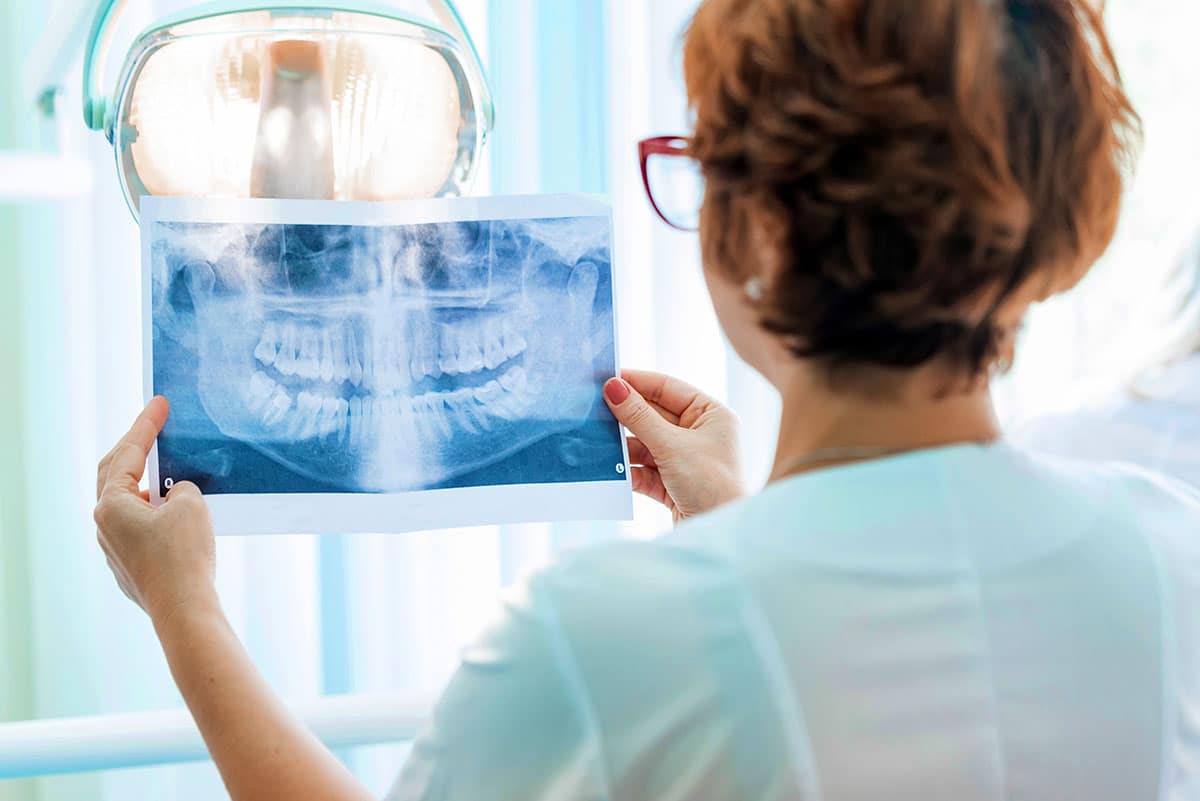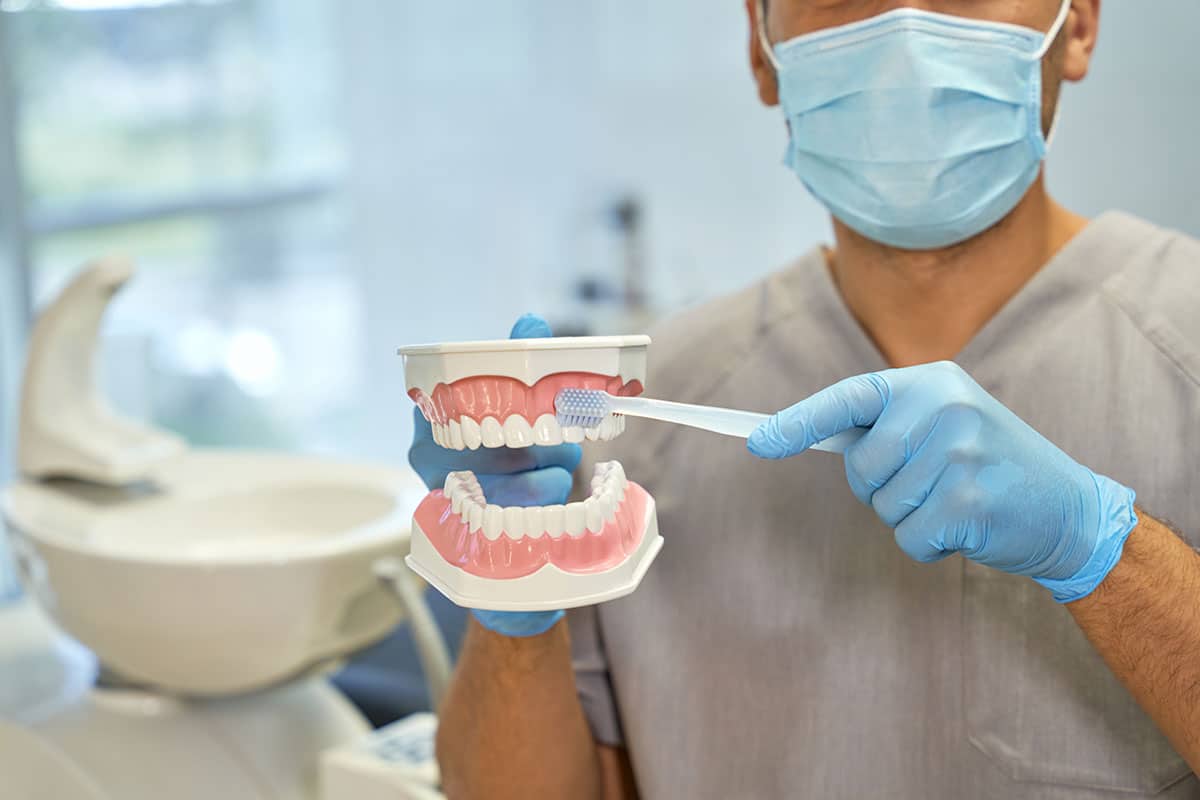The mouth-body connection: How oral health affects your overall health

Research has shown a firm link between oral health problems (periodontal disease) and chronic conditions like heart disease, diabetes, osteoporosis, etc. How oral health affects overall health is a serious topic that needs to be paid attention to.
Amongst putting patients at risk of needing a root canal due to a tooth abscess, bacteria and diseases in the mouth are not isolated from the rest of the body. Unfortunately, they can spread and cause other conditions. This is why maintaining effective dental hygiene is essential in preventing periodontal disease. Treating periodontal disease will prevent gum disease and even bone loss. Effective treatment can also go a long way toward preventing other health concerns.
Table of Contents
How oral health affects overall health

Just like in other parts of the body, the mouth contains many bacteria, primarily harmless. However, it serves as a gateway to the digestive and respiratory systems, and some of these bacteria can be disease-causing.
Ordinarily, the body’s natural defences and proper oral hygiene practices like daily brushing and flossing keep bacterial levels in check. Still, without good oral care, bacteria can increase, potentially leading to oral infections, such as tooth decay and gum disease.
These oral health concerns and the subsequent increase in bad bacteria present in your mouth can profoundly impact your overall health due to the interconnectedness of the mouth with the rest of the body.
One of the fundamental mechanisms through which bad oral health affects overall health is the spread of bacteria and inflammation.
What medical conditions might be linked to your oral health?
We’ll go into each of these in more detail further on, but for now, the following medical conditions have been linked to poor oral health that has developed into periodontal disease:
Endocarditis
Endocarditis is the infection of the heart’s inner lining (endocardium) can occur when bacteria or germs from another part of the body, such as the mouth, enter the bloodstream and attach to specific areas within the heart.
Cardiovascular disease
Although the precise connection remains unclear, some research suggests a link between heart disease, blocked arteries, stroke, and the inflammation and infections that oral bacteria can induce.
Pregnancy and birth complications
Periodontitis has been associated with premature birth and low birth weight in infants.
Pneumonia
Certain oral bacteria can be aspirated into the lungs, potentially leading to pneumonia and other respiratory illnesses.
Are there medical conditions that contribute to bad oral health?
Unfortunately, patients with the following underlying conditions are at greater risk of periodontal disease and are more susceptible to overall health complications.
Diabetes
Diabetes lowers the body’s resistance to infection, increasing the risk of gum problems. Gum disease appears to be more prevalent and severe in individuals with diabetes. Research also indicates that gum disease patients may have difficulty controlling their blood sugar levels, highlighting the importance of regular periodontal care.
HIV/AIDS
People with HIV/AIDS frequently experience oral issues, including painful mucosal lesions.
Osteoporosis
This bone-weakening condition is associated with bone loss in the mouth’s supporting structures and tooth loss. Some medications used to treat osteoporosis carry a slight risk of jaw bone damage.
Alzheimer’s disease
The decline in oral health is observed to parallel the progression of Alzheimer’s disease.
What is periodontal disease?

Periodontal disease, often called gum disease, is a common and progressive condition affecting the tissues surrounding and supporting your teeth. It typically begins with the inflammation of the gums (gingivitis) and, if left untreated, can advance to involve the bone and ligaments that hold your teeth in place (periodontitis).
Here are the key stages of periodontal disease:
Gingivitis: Gingivitis is the earliest stage of periodontal disease and is characterized by inflammation of the gums. It is usually caused by the accumulation of plaque, a sticky film of bacteria, on the teeth and gums. Symptoms of gingivitis may include redness, swelling, tenderness, and bleeding of the gums, especially during brushing and flossing. Gingivitis is typically reversible with good oral hygiene practices.
Periodontitis: If gingivitis is not treated, it can progress to periodontitis. This stage involves the deeper supporting structures of the teeth, including the bone and connective tissues. Periodontitis can form pockets between the teeth and gums, which can trap plaque and bacteria. As the disease progresses, these pockets can deepen, and the bone supporting the teeth may be damaged. Symptoms of periodontitis may include gum recession, tooth mobility, persistent bad breath, and, in advanced cases, tooth loss.
Advanced periodontitis: In the most severe cases, periodontitis can advance to advanced periodontitis, with extensive damage to the supporting bone and tissues. Teeth may become loose or shift in position, and tooth loss is more likely.
Periodontal disease is a common condition, and its development is influenced by various factors, including genetics, oral hygiene practices, smoking, certain medical conditions (such as diabetes), and certain medications. Periodontal disease has also been associated with systemic health issues, including heart disease, diabetes, and respiratory problems.
Treatment for periodontal disease typically involves professional dental cleanings, scaling and root planing (deep cleaning), and sometimes surgical procedures to address severe cases. Good oral hygiene practices, including regular brushing, flossing, and dental check-ups, are essential for preventing and managing periodontal disease. Early detection and intervention are vital to preserving gum and tooth health.
Periodontal Disease and Diabetes

Diabetes is an incurable disease that affects many people, approximately 12 to 14 million in the United States. It occurs when too much sugar or glucose is in a patient’s blood. Type two diabetes develops when the body cannot manage its insulin levels, leaving too much glucose in the bloodstream. Type 1 diabetes is when the patient cannot produce any of their insulin at all. Diabetes can also lead to severe health conditions like stroke and heart disease.
Research suggests that diabetics are far more likely to develop periodontal disease than those who are not diabetic. Those who cannot effectively control their blood sugar are much more likely to develop periodontal disease more commonly and severely than those who manage these levels correctly.
This link is a result of a wide range of factors. As a diabetic, the individual is more susceptible to all kinds of infections, including ones of a periodontal nature. This is because diabetes slows down blood circulation, giving bacteria ideal conditions to colonize and multiply. The disease also diminishes the body’s ability to fight off infections, which does not help the gum tissue from being infected.
Both moderate and severe periods of periodontal disease will raise blood sugar levels, which only increases the time the body has to operate with high blood sugar levels. Diabetics suffering from periodontal disease are more likely to have increased blood sugar levels, making controlling their blood sugar much more difficult. The elevated sugar levels in their saliva also foster the growth of disease-causing bacteria in their gums.
Thickening of the blood vessels is another problem for diabetics. When thickening, they cannot provide nutrients and remove waste from the body, their primary function. This means the damaging debris left in the gum tissue can accumulate, causing disease and infection.
Smoking may harm everyone’s overall and dental health, but it especially damages diabetics. Periodontal disease is 20 times more likely in diabetic smokers ages 45 and older than those who do not smoke at all.
Diabetics need to maintain good oral hygiene. Flossing, brushing, and regular dental appointments will help reduce harmful bacteria and prevent periodontal disease.
Is there a link between gum disease and heart disease or strokes?

Coronary heart disease is caused when plaque and fatty proteins accumulate on the interior of the arteries. This means there is less room for blood to flow, reducing circulation. This leads to lower levels of oxygen reaching the heart, which causes symptoms such as chest pain, shortness of breath and even heart attacks.
Patients who suffer from oral conditions are almost twice as likely to have coronary artery disease than those with good oral health. Existing heart conditions may intensify if the patient suffers from periodontal disease. The odds of a stroke also rise with periodontal disease. A stroke is when the blood flow to the brain is abruptly interrupted. Blood clots can cause this.
One link between periodontal disease and heart disease is oral bacteria infiltrating the bloodstream. Some of the wide range of bacteria can adhere to the coronary arteries’ plaque. This only impedes more and more blood from getting to where it needs to go, further boosting the risk of heart attacks and other medical conditions.
The swelling generated by periodontal disease boosts the patient’s white blood cell count and C-reactive proteins (CRP). This protein has been connected with heart disease for a long time. When there is more of it in the body, it augments its inflammatory response. An inflamed artery can slow down blood flow just as plaque can and have similar consequences like strokes and heart attacks.
Coronary heart disease is the number one cause of death in the United States. Keeping a robust oral hygiene routine and treating any conditions can help you reduce your risk factors for these life-threatening conditions.
Does gum disease affect pregnancy outcomes?

When a pregnant mother has periodontal disease, it can be transferred to their children, which increases their risk. With the hormonal changes accompanying pregnancy also comes an increased risk of developing periodontal disease like the swelling of the gums or gingivitis. These conditions have been connected to low birth weight, premature birth and preeclampsia. Luckily, stopping periodontal disease growth can reduce the likelihood of these complications by 50%. This can be achieved by treating existing problems and preventing future ones by practicing strong oral hygiene.
The increased level of prostaglandin in mothers who suffer from advanced forms of periodontal disease will hurt the child. This compound induces labour, which can cause premature birth and low birth weight for the child. Prostaglandin levels are increased by periodontitis.
C-reactive protein has not only been linked to heart disease but has been connected to premature births as well. The inflammation caused by elevated levels of CRP has been linked to blood clots and clogged arteries. It is unknown why the link between this protein and preeclampsia exists, but the data suggests that they are. High levels of CRP in early pregnancy do, however, increase the odds of having preeclampsia.
Bacteria in the gum sockets of a mouth with periodontal disease can move through the bloodstream and damage other body areas. Pregnant women are susceptible to these bacteria growing in the mammary glands and the coronary arteries.
Preventing gum disease is more critical if you are pregnant than you may have thought. We at Martindale Dental can help assess your oral health, treat any problems, and implement preventive measures.
Periodontal Disease and Respiratory Disease

Respiratory disease begins when tiny droplets are inhaled into the lungs. These droplets can bring bacteria into the lungs, impairing the patient’s ability to breathe. This bacteria has recently been shown to be able to come from the mouth as well and can exacerbate pre-existing lung conditions.
Pneumonia and other conditions can be caused by bacteria that develop in the oral cavity and travel to the lungs. Patients with periodontal disease are far more likely to suffer from this condition. Periodontal disease may also play a part in catching emphysema and bronchitis. Chronic obstructive pulmonary disease (COPD) has been shown to grow worse if the patient has periodontal disease.
One of the main reasons for the links between periodontal disease and respiratory problems is decreased immunity. Respiratory problems tend to occur in patients with low immunity, which does not help them fend off the advance of bacteria in the mouth. As soon as periodontal disease is involved, it exacerbates respiratory issues.
Swelling within the mouth is also connected to respiratory conditions. The bacteria in the mouth that causes the inflammation can move to the lungs and further inflame the lung tissue. This creates breathing problems because it does not allow the same amount of air to pass through the lungs.
If you suffer from either periodontal or respiratory disease, your doctor and our dentists will work together to find the best treatment plan.
Periodontal Disease and Osteoporosis

Osteoporosis is when the bone tissue thins and loses density over time. It is more common in older patients, usually women. It starts when the body cannot form sufficient new bone or absorbs excessive old bone. The leading cause among men is testosterone dropping and estrogen dropping in women. This increases the risk of fractures and breaks, so sufferers must be careful. Since osteoporosis and periodontal disease can cause bone loss, a connection has been investigated. Postmenopausal women with osteoporosis are 86% more likely to contract periodontal disease. Bone loss in the jaw can cause tooth loss, which can be prevented by fighting periodontal disease. Sufferers of osteoporosis can reduce tooth loss by treating periodontal disease.
These two conditions are linked to an estrogen deficiency. An estrogen deficiency boosts the rate at which bone is lost, not just in the mouth but the entire body. It also boosts the speed at which tissue and fibres that keep teeth in place are lost; this can cause teeth to fall out. Osteoporosis is partially caused by lower mineral bone density. Periodontal disease boosts swelling and damages bones, making them break down more quickly. This is precisely why periodontal disease can harm those who suffer from osteoporosis. If you have osteoporosis, you must take precautionary steps to safeguard your teeth and bones from illness.
Can oral health affect your mental health?

Yes, periodontal disease can potentially affect your mental health. While the relationship between periodontal disease and mental health is complex and not fully understood, several factors may contribute to this connection:
Pain and discomfort
Periodontal disease can cause pain, discomfort, and inflammation in the gums and teeth. Chronic pain can lead to frustration, irritability, anxiety, or depression.
Impact on self-esteem
Oral health problems, including tooth loss, gum recession, and bad breath associated with periodontal disease, can significantly impact a person’s self-esteem and self-confidence. These negative feelings about one’s appearance can contribute to mental health issues.
Social isolation
Individuals with periodontal disease may feel self-conscious about their oral health and avoid social situations, including smiling, talking, or eating with others. This social isolation can lead to feelings of loneliness and depression.
Functional impairment
Periodontal disease can affect a person’s ability to eat and speak comfortably. Difficulty in performing these essential functions can lead to frustration and stress.
Inflammatory response
Chronic inflammation, a hallmark of periodontal disease, has been linked to an increased risk of developing mental health conditions, including depression and anxiety.
Biological pathways
Some researchers suggest that the inflammatory response triggered by periodontal disease may affect the brain through various biological pathways, potentially contributing to mental health issues.
It’s essential to recognize that while there may be associations between periodontal disease and mental health, the exact nature of this relationship can vary from person to person.
How to reverse periodontal disease

Reversing periodontal disease, especially in its more advanced stages, typically requires professional dental intervention. However, you can take steps to improve your oral health and manage the condition. Here’s how to approach the process:
Regular dental check-ups
Schedule regular check-ups with your dentist, ideally every six months or as your dental professional recommends. Regular dental visits are essential for monitoring the progression of periodontal disease and receiving necessary treatments.
Professional dental cleanings
Professional dental cleanings, often referred to as dental scaling and root planing, are crucial for removing plaque and tartar buildup both above and below the gum line. A dental hygienist or dentist should perform these cleanings.
Proper oral hygiene practices
Maintain a rigorous oral hygiene routine at home. This includes brushing your teeth at least twice daily with fluoride toothpaste and a soft-bristle toothbrush. Be thorough in brushing and pay attention to the gumline. Don’t forget to brush your tongue as well. Additionally, floss or use interdental brushes daily to clean between your teeth and along the gumline.
Antibacterial mouthwash
Consider using an antibacterial mouthwash recommended by your dentist to reduce bacterial levels in your mouth. Mouthwash can help control the growth of harmful bacteria that contribute to periodontal disease.
Quit smoking
If you smoke, quitting is crucial. Smoking is a significant risk factor for periodontal disease and can hinder the effectiveness of treatment.
Balanced diet
Eat a balanced diet rich in fruits, vegetables, whole grains, lean protein, and low-fat dairy products. Nutrients from these foods can support gum health.
Stress management
Stress can weaken the immune system and exacerbate periodontal disease. Use stress-reduction techniques such as exercise, meditation, or yoga to manage stress levels.
Medication management
If you have underlying medical conditions or are taking medications that affect gum health, work closely with your healthcare provider and dentist to manage these factors effectively.
Follow-up appointments
After receiving initial treatment for periodontal disease, follow up with your dentist as recommended. Maintenance appointments are crucial for monitoring your progress and adjusting your treatment plan.
It’s essential to understand that while these steps can help manage and halt the progression of periodontal disease, the condition may not be entirely reversible in its advanced stages. Early detection and intervention are key to achieving the best possible outcomes. Consult with your dentist to create a personalized treatment plan tailored to your specific needs and the severity of your periodontal disease.
Martindale Dental provides both general and specialty dentistry under one roof. For more than 20 years, our dentists have been advocates for their patient’s oral health care needs.
Our dental offices are conveniently located throughout the GTA in Hamilton (Jackson Square), and St. Catharines, Ontario. We offer convenient appointments before or after work & on weekends.
Martindale Dental provides both general and specialty dentistry under one roof. For more than 20 years, our dentists have been advocates for their patient’s oral health care needs.
Our dental offices are conveniently located throughout the GTA in Hamilton (Jackson Square), and St. Catharines, Ontario. We offer convenient appointments before or after work & on weekends.
Related services
- Introduction
- Periodontal Disease
- Teeth Cleaning
- Scaling and Root Planing
- Dental Implants
- Bone Grafting
- Crown Lengthening
- Oral Cancer Exam
- Bruxism Treatment
- Bite Adjustment
- Gum Surgery
- Cosmetic Periodontal Surgery
- Guided Bone and Tissue Regeneration
- The Mouth Body Connection
- Women and Periodontal Health
- Fresh Breath Oravital Clinic
- Perioscopic Treatment
- Frenectomy
- Sinus Augmentation
- Osseus Surgery
- Pre-Operative Surgical Instructions
- Post-Operative Surgical Instructions
- Teeth In An Hour
